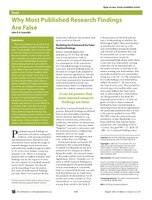
Photo from wikipedia
Abstract Assessment of replicate quality is an important process for any shotgun proteomics experiment. One fundamental question in proteomics data analysis is whether any specific replicates in a set of… Click to show full abstract
Abstract Assessment of replicate quality is an important process for any shotgun proteomics experiment. One fundamental question in proteomics data analysis is whether any specific replicates in a set of analyses are biasing the downstream comparative quantitation. In this paper, we present an experimental method to address such a concern. PeptideMind uses a series of clustering Machine Learning algorithms to assess outliers when comparing proteomics data from two states with six replicates each. The program is a JVM native application written in the Kotlin language with Python sub-process calls to scikit-learn. By permuting the six data replicates provided into four hundred triplet non redundant pairwise comparisons, PeptideMind determines if any one replicate is biasing the downstream quantitation of the states. In addition, PeptideMind generates useful visual representations of the spread of the significance measures, allowing researchers a rapid, effective way to monitor the quality of those identified proteins found to be differentially expressed between sample states.
Journal Title: SoftwareX
Year Published: 2021
Link to full text (if available)
Share on Social Media: Sign Up to like & get
recommendations!